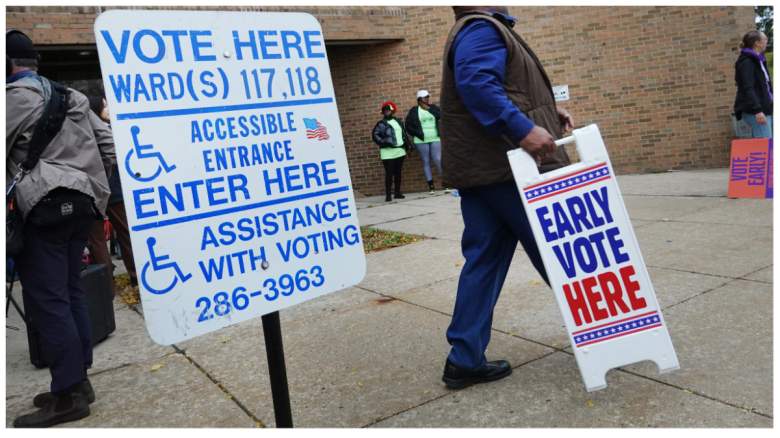
Kimberly Zapata was the deputy director of the Milwaukee Elections Commission who was fired by the city’s mayor after being accused of requesting “fictitious military ballots” and sending them to a Wisconsin legislator.
The accusations against Zapata were revealed by Milwaukee Mayor Cavalier Johnson in a November 3, 2022, press conference. He appeared alongside Milwaukee Election Commission Executive Director Claire Woodall-Vogg.
Zapata has now been criminally charged. You can see the complaint here: criminal-complaint_1-zapata-kimberly-d
The news came as a hotly contested midterm election is less than a week away. Wisconsin has tight races for governor, attorney general, and U.S. Senate, as Republican Sen. Ron Johnson is battling to retain his seat.
Here’s what you need to know:
1. Johnson Accused Zapata of Sending Fake Military Ballots to a Republican Lawmaker
According to Johnson, Zapara is accused of requesting fake military ballots on a state website and sending them to a major critic of Wisconsin’s election process, Republican state lawmaker Janel Brandtjen.
“The City of Milwaukee has removed the deputy director of our Elections Commission,” Johnson, a Democrat in his first term as mayor, said in the news conference.
“I was stunned, absolutely stunned, to hear the very serious allegations against her. I was told just yesterday that she apparently sought fictitious military ballots from a state elections website and had those ballots directed to an elected state representative.”
Zapata is charged with felony misconduct in public office, and three counts of making a false statement to obtain an absentee ballot, which are misdemeanor charges.
According to the complaint, “JB” (state Rep. Janel Brandtjen) received three absentee ballots at her address in Menomonee Falls, Wisconsin. They were issued in the names of Holly Brandtjen, Holly Jones, and Holly Adams. None of the individuals exist.
They were mailed by municipal clerks in Menomonee Falls, Shorewood and South Milwaukee, classified as military absentee ballots, and requested via the MyVote website. Brandtjen reported the ballots to the Waukesha County Sheriff’s Department, which started an investigation.
The MyVote website is a site administered by the Wisconsin Elections Commission.
Woodall-Vogg told investigators that, on October 31, 2022, she sent Zapata an article on an unknown person applying for military absentee ballots and having them sent to Brandtjen. Zapata denied knowing about it.
She then sent Zapata a message with Brandtjen’s statement that it was easy to receive military ballots, and Zapata responded, “She has a point.”
On November 1, 2022, Zapata approached Woodall-Vogg at work and admitted that “she had created three fraudulent voters and used that fraudulent information to send three ballots to JB. Zapata told Woodall-Vogg that she made up the identities of the voters and sent them to show how easy it is to commit fraud in this manner.”
The fraudulent ballots were requested on October 25, 2022, at 5:51 a.m., 5:56 a.m. and 5:59 a.m.
The person “who created the records for each name certified that they were a military voter. All three voter records had the same birthday entered and all three ballots were requested by the same I{ address within a 20 minute window.” the complaint says.
“Zapata admitted that she was attempting to highlight flaws within the absentee system. She stated that attempting to highlight the flaws within the system is an attempt to maintain election integrity, which is part of her job.”
2. Woodall-Vogg Said Zapata Was ‘Pointing Out’ That a Person Could ‘Make Up a Person & Request a Ballot’
Asked for additional details, Woodall-Vogg said Zapata “went on the public facing MyVote website” to request the ballots, noting that service members in the military do not have to provide photo identification under Wisconsin law.
“She was pointing out that you can go on to the public system, make up a person and request a ballot,” said Woodall-Vogg. She said that Zapata then “sent it to a state legislative member” in order to “alert them to this vulnerability.”
But Johnson said Zapata’s motive doesn’t matter to him.
“I will not accept. I will not tolerate and I certainly will not defend any misrepresentation by a city official involved in elections,” the mayor said, adding, “It doesn’t matter to me that this might have been an effort to expose a vulnerability that state law created.”
He said it also doesn’t matter to him “that the alleged crime did not take place at work” and that it did not involve Milwaukee ballots. “Nor does it matter that there was no attempt to vote illegally or tamper with any election results,” he said, accusing Zapata of violating trust.
Zapata stated that “she went to the MyVote website and fabricated three individual who did not exist,” the complaint says.
“Zapata did this because she wanted to make a point that there is fraud in existence. She stated that it is not the conspiracy theories out there, but she wanted to bring the actual true fraud out. Zapata stated that she felt overwhelmed due to the threats of violence the Election Commission was receiving, in addition to the constant daily harassment and accusations of lying and hiding things. She stated she wanted the truth to come out so that they could focus on the actual problems.”
She had the ballots sent to Brandtjen “in an attempt to redirect JB’s focus away from outrageous conspiracy theories and to something that is actually real,” the complaint says.
She accessed Brandtjen’s address through the state voter registration database only available to municipal employees.
3. Zapata, Who Was Fired, Worked for the City of Milwaukee for 10 Years
Zapata had been with the Election Commission for about seven years and was with the city for 10, Woodall-Vogg said. Her LinkedIn page lists only the deputy director’s position.
The complaint says that, as deputy director, Zapata’s duties included supervising voter registration and all aspects of absentee ballots. “She ran all the early voting sites and ran the central count facility on election day. She stated she was knowledgeable about absentee ballots and that part of her job was maintaining the integrity of absentee ballots.”
She earned $60,866 in 2021, according to GovSalaries.com.
She is listed as a departmental record coordinator for the City of Milwaukee Election Commission. That reference calls her Kim Zapata.
She was also listed on a website as the contact person if people wanted to become poll workers.
According to Johnson, law enforcement is reviewing the matter.
“The employee in question had her access to the offices and computer systems deactivated. Her employment in the Election Commission was terminated,” Johnson said, adding that she has been “forthcoming.”
“Election officials need to follow the law. However, the vulnerabilities that continue to be exposed in the MyVote system for requesting absentee ballots should be shocking to everyone. We remain very concerned that these vulnerabilities exist and that the Elections Commission is not taking the proper steps to mitigate the risks of potential fraud those vulnerabilities in the system create,” said RPW Communications Director Chad Doran, in an emailed statement.
4. Brandtjen Revealed Earlier in the Week That Someone Sent Military Ballots to Her Home Addressed to ‘Holly’

TwitterJanel Brandtjen
Brandtjen, a Republican, chairs the Assembly Committee on Campaigns and Elections. She sent out a press release earlier in the week revealing that she had received “authentic military ballots at her home address.” She also revealed that the Waukesha County Sheriff’s Department was investigating.
“Representative Brandtjen was surprised to find three military ballots sent to her home address from clerks in Menomonee Falls, South Milwaukee and Shorewood,” Brandtjen’s press release noted.
“The ballots were all addressed to ‘Holly’ with three different last names. None of these individuals reside, or have resided at her address, and the Representative did not request the ballots. After Rep. Brandtjen made inquiries, she realized these three ‘Hollys’ probably don’t exist. If they did, why would they send ballots to her house?”
Said Brandtjen, who has been a leading critic of the 2020 election process in Wisconsin, “I believe someone was trying to point out how easy it is to get military ballots in Wisconsin. Registration for military ballots is not required, so a fictitious name and birthdate is all that is required to obtain a military ballot online.”
She added: “Feeling shocked about this situation is an understatement because it demonstrates stolen valor from those who protect this nation. I think it’s sad that people feel they have to break the law to get the attention of the legislature. This is now the second time citizens have tried to point out loopholes in our elections.”
Brandtjen alleged on WISN-1130 radio on November 4, 2022, that she believes Zapata “was trying to frame me” or get her “in trouble before the election.”
She said Zapata could have just “picked up the phone” and told her about the military ballot issue so she could bring it to the public’s attention. She alleged Zapata was motivated by trying to “smear” her character and embarrass her. Brandtjen said these are “the same people” she was sending open records to about election issues, adding that she (Brandtjen) is “not beloved” in the City of Milwaukee.
5. A Wisconsin Man Was Charged Last Month After Being Accused of Fraudulently Requesting Absentee Ballots from MyVote
In September 2022, the Wisconsin Department of Justice (DOJ) announced that Harry E. Wait, 68, of Union Grove, Wis., was “charged with two counts of Election Fraud and two counts of Unauthorized Use of an Individual’s Personal Identifying Information in connection with his requesting absentee ballots for two other individuals.”
According to the criminal complaint, on the evening of July 26, 2022,
“Wait went to MyVote.wi.gov and requested absentee ballots for two individuals to be sent to his address in Union Grove, Wis.,” a DOJ press release said.
“The complaint states that, in multiple online videos and other correspondence, Mr. Wait admitted requesting the ballots using the other individuals’ personal identifying information. The complaint states that the individuals did not authorize Mr. Wait to use their personal identifying information for this purpose.” Wait also indicated he was trying to highlight flaws in the election process.
As in any criminal proceeding, Mr. Wait is presumed innocent until proven guilty.
READ NEXT: The Death of Takeoff

